 Petzlover
Petzlover Bearded Collie is originated from United Kingdom but Ibizan Hound is originated from Spain. Bearded Collie may grow 19 cm / 7 inches shorter than Ibizan Hound. Both Bearded Collie and Ibizan Hound are having almost same weight. Bearded Collie may live 3 years more than Ibizan Hound. Both Bearded Collie and Ibizan Hound has almost same litter size. Bearded Collie requires High Maintenance. But Ibizan Hound requires Low Maintenance
Bearded Collie is originated from United Kingdom but Ibizan Hound is originated from Spain. Bearded Collie may grow 19 cm / 7 inches shorter than Ibizan Hound. Both Bearded Collie and Ibizan Hound are having almost same weight. Bearded Collie may live 3 years more than Ibizan Hound. Both Bearded Collie and Ibizan Hound has almost same litter size. Bearded Collie requires High Maintenance. But Ibizan Hound requires Low Maintenance
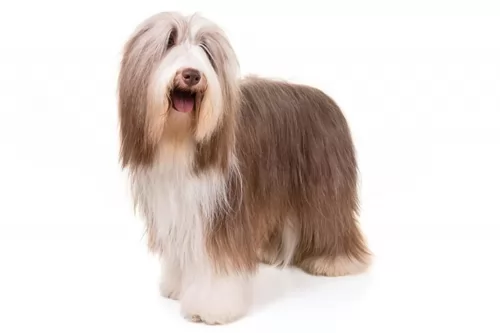 This long-haired herding breed was bred by mixing the two sheepdog breeds: the Scottish dogs and the Polish sheepdogs. The Bearded Collie gained the popularity during the last century by winning some of the Dog Shows. This friendly dog with the beautiful coat is surely one of the most specific pets. Nowadays, the Bearded Collie is very popular. The organizations for breeding, saving, rescuing and adopting this breed can be found in the USA.
This long-haired herding breed was bred by mixing the two sheepdog breeds: the Scottish dogs and the Polish sheepdogs. The Bearded Collie gained the popularity during the last century by winning some of the Dog Shows. This friendly dog with the beautiful coat is surely one of the most specific pets. Nowadays, the Bearded Collie is very popular. The organizations for breeding, saving, rescuing and adopting this breed can be found in the USA.
 This lean, speedy and agile hound dog looks and acts very much like a Pharaoh Hound except the Ibizan Hound is larger and a different color. The image of dogs that look like the Ibizan have been seen since 3400 BC in Egypt. The dogs were probably brought by sailors to Ibiza and surrounding islands. They came about 700-900 BC. It is believed that they actually came for the island of Elvissa and Spain, where they speak Catalan. It was also known in France as the le chanigue. There job was the same. To hunt rabbits.
This lean, speedy and agile hound dog looks and acts very much like a Pharaoh Hound except the Ibizan Hound is larger and a different color. The image of dogs that look like the Ibizan have been seen since 3400 BC in Egypt. The dogs were probably brought by sailors to Ibiza and surrounding islands. They came about 700-900 BC. It is believed that they actually came for the island of Elvissa and Spain, where they speak Catalan. It was also known in France as the le chanigue. There job was the same. To hunt rabbits.
They were fast hunting greyhound type dogs. They hunted for rabbit for the Ibizaners and themselves. These dogs hunt by day and by night. They are not just sight hounds, they also hunt by smell and hearing, in packs or by themselves. They use their sight to find and corner the prey. Then they act like retrievers and bring it back to the hunter. Their function and look is very similar to several other dogs such as the Pharaoh Hound, the Greyhound, the Portuguese Podengo, the Cimeco dellEtna and the Podence Canario. The Ibizan is larger than any of these, but all these breeds are considered to be “primitive”.
Within the breed itself there are smooth, wire and longhaired Ibizan Hounds. The Smooth is by far the most common. A great jumper, nimble runner built for stamina, the Ibizan Hound was just what the island people needed. The breed lived in isolation on the island for many centuries, under a variety of rulers including the Romans, Egyptians, Vandals, Carthaginians, Chaldeans, Arabs and Spanish. Because of the harsh island conditions, the farmers only allowed the best hunters among the Ibizan Hounds to procreate thus assuring a breed that is unchanged from ancient stock.
By 1950 the Ibizan Hound was brought to America. Because this dog is not a pet but a working machine, it took awhile for the breed to become popular enough to be recognized by the American Kennel Club (AKC) in 1979. Still the Ibizan Hound is a rare breed with the female being a better hunter than the male. One of the most common activities of this breed in the U.S. is lure coursing. These events are sponsored by AKC and ASFA as well as racing events in the NOTRA and LGRA.
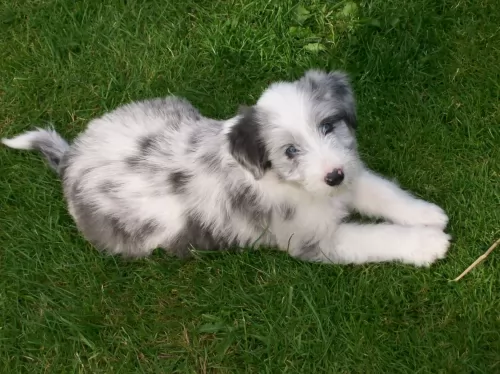 The Beardie is easy to recognize because of the longer hairs on the cheeks, chin and under the lower lip. This medium-sized Bouncing Beardie is usually the great family pet because he is very friendly and loving. This breed is extremely active and they are energetic despite their longer bodies. They grow up to have more than one coat colour, but they are all born one coloured. They always have white or cream markings. This smart dog can be very stubborn and independent, if you keep your dog in a yard, he will use every chance to escape.
The Beardie is easy to recognize because of the longer hairs on the cheeks, chin and under the lower lip. This medium-sized Bouncing Beardie is usually the great family pet because he is very friendly and loving. This breed is extremely active and they are energetic despite their longer bodies. They grow up to have more than one coat colour, but they are all born one coloured. They always have white or cream markings. This smart dog can be very stubborn and independent, if you keep your dog in a yard, he will use every chance to escape.
 The breed is agile, elegant, athletic and graceful. At the same time the Ibizan Hound is a fierce hunter travelling at unreal speeds to catch his rabbit prey. They are a hardy breed with a lean and long neck, and a lean, muscled body with laid back shoulders. The ears are specific to the breed, with a broad base leading to long, beautiful ears. They have tan eye rims, nose, foot pads, and ears. The eyes themselves are an amber with an intelligent and alert expression.
The breed is agile, elegant, athletic and graceful. At the same time the Ibizan Hound is a fierce hunter travelling at unreal speeds to catch his rabbit prey. They are a hardy breed with a lean and long neck, and a lean, muscled body with laid back shoulders. The ears are specific to the breed, with a broad base leading to long, beautiful ears. They have tan eye rims, nose, foot pads, and ears. The eyes themselves are an amber with an intelligent and alert expression.
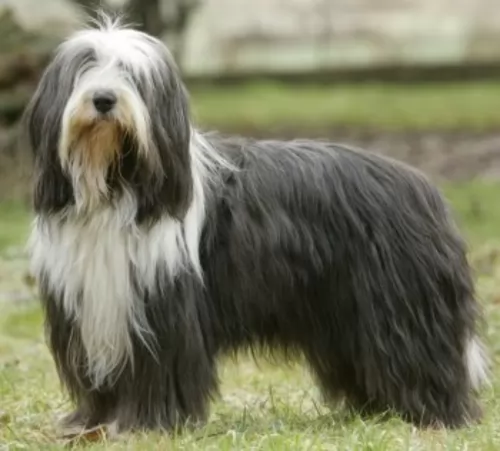 The Bouncing Beardie is great with children. They are very playful, jumpy and have generally very sweet and gentle personality. Children love them because they never get tired. If properly socialized, this dog can be the main attraction for any child.
The Bouncing Beardie is great with children. They are very playful, jumpy and have generally very sweet and gentle personality. Children love them because they never get tired. If properly socialized, this dog can be the main attraction for any child.
Herding, agility shows, obedience competitions, treibball, show dogs, trally...
This breed is very friendly. If your family is about to raise the Bearded Collie, prepare to have a pet that is highly affectionate and bonded with the members of the family. They don’t do well if left alone. They usually don’t bark and they are never destructible, but loneliness somehow triggers odd behaviour with this breed. They are not usually scared of strangers. If they are trained and socialized, you will be able to take your Beardie anywhere you go.
Some say that is very easy to train the Bearded Collie. The rule for this breed is to start the obedience training while they are very small. They are generally very independent, and they will try to do things in their own way. If you start your training early before your Beardie forms this kind of personality, you will have a wonderful pet.
 They love children but be careful they do not knock them over and don’t let the children play to rough.
They love children but be careful they do not knock them over and don’t let the children play to rough.
Exceptional jumping ability, speed and stamina.
Must have a large fenced yard and a place to run full out.
Very intelligent with excellent learning ability.
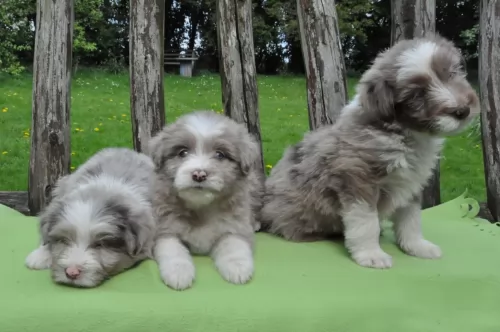 This breed is generally very healthy. They don’t have some major health issues. Some of the issues that are registered are:
This breed is generally very healthy. They don’t have some major health issues. Some of the issues that are registered are:
The degenerative disease that causes the blindness.
When the hormone produced by the thyroid gland is abnormally low.
That is generally the hereditary disease, can also be caused by bad diet or injuries.
To food, chemicals, pollen, dust...
That usually happens because of their dropped ears that are not very easy to clean.
 Despite being isolated on the islands for all those years, the Ibizan Hound has several tendencies toward medical issues:
Despite being isolated on the islands for all those years, the Ibizan Hound has several tendencies toward medical issues:
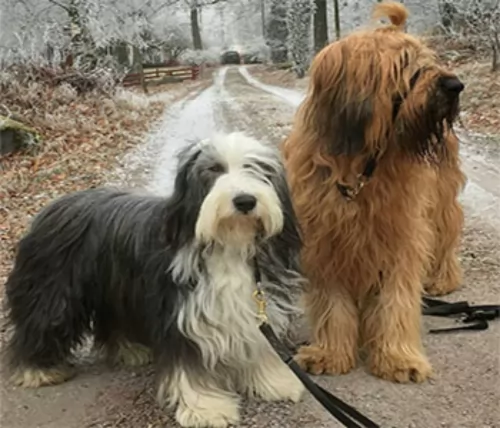 Raising your Bearded Collie pup on a high-quality food is usually enough for a puppy. Make sure that portions are appropriate for his age and weight. Once your pet is more than six months old, they will need only two meals per day. They get obese very easy. Don’t train them with the treats.
Raising your Bearded Collie pup on a high-quality food is usually enough for a puppy. Make sure that portions are appropriate for his age and weight. Once your pet is more than six months old, they will need only two meals per day. They get obese very easy. Don’t train them with the treats.
To care for your Bearded Collie, you must be aware of the grooming responsibilities that come with this longhaired pet. During the shedding period, it is required to brush them daily. Bathing is not a regular necessity but it will be easier to keep him clean and well groomed if you care about your pet all the time. Some people like to shorten the coat for their Beardie, and it is usually done during summer. Make sure to take him to regular ear, eye, teeth and hip vet checks.
The Bearded Collie is a breed that requires daily activity. They have very playful nature and they love to run, play and spend time outdoors. The best option will be a big yard so that Beardie can run for hours without the leash.
 Your Ibizan Hound is an athlete and needs to be fed like one. As a puppy he needs high quality breed or group (hound) specific food. Feed her 3-4 times a day based on calories. A puppy needs about 866 calories each day.
Your Ibizan Hound is an athlete and needs to be fed like one. As a puppy he needs high quality breed or group (hound) specific food. Feed her 3-4 times a day based on calories. A puppy needs about 866 calories each day.
If your dog participates in sports as adults, they need between 1450 and 2900 calories each day. The exact amount depends on how much activity the dog is engaged in. Feed at least 2 times a day.
Great speed and stamina
Your Ibizan Hound is a working athlete. He needs a lot of exercise and he needs a chance to run full out so access to land is essential. It can be a large back yard, or it can be a dog park. No matter what it is, it is essential for the Ibizan Hound. She will also require long walks at least a couple times a day. However, do not over exercise your puppy. They are great jumpers as well as runners.
The sport of lure coursing was made for the Ibizan in the same way that it was made for the Greyhound. They are good at Flyball and agility as well.